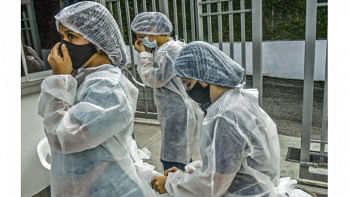Bangladesh must explore sending skilled nurses abroad

Chief Adviser Prof Muhammad Yunus, while speaking at an event back in February this year, emphasised two issues that are hindering Bangladesh's progress: the widespread use of forged documents by migrant workers, and the lack of certified nurses despite demand from around the world. He called for a serious re-evaluation of our current strategy and ascribed both issues to systemic faults, excessive bureaucracy, and opposition to reform.
It is important to have a comprehensive understanding of the global need for nurses and midwives before we make any observations or policy recommendations regarding the nursing profession in Bangladesh. Approximately 2.9 crore nurses and 22 lakh midwives are now providing healthcare worldwide. By 2030, there might be a shortage of roughly 45 lakh nurses and 3.1 lakh midwives because of the growing number of ageing population, expanding healthcare demands, and population growth.
To meet this growing demand, many countries have already started looking for international nurses to recruit. For instance, the United States will require more than 12 lakh nurses by 2030, while Germany will require more than 500,000. Additionally, as 24 percent of the UK's National Health Service (NHS) nurses received their training abroad, these countries are hiring more foreign-trained nurses and expediting credentialing procedures to meet their nursing shortages.
The Philippines and India are the two countries that contribute the most to the nursing workforce worldwide. About 640,000 Indian nurses work overseas, with a sizable portion of them based in the Gulf countries. As the largest represented non-UK nationality in the NHS, Indian professionals make up 10.1 percent of all full-time equivalent nurses and health visitors in the UK. Meanwhile, 28,258 Filipino nursing graduates took the US licensure exam in 2024, and 54 percent of the first-time test-takers passed the test while 36 percent of repeat takers succeeded. The Philippine economy benefits greatly from the remittances sent home by Filipinos employed abroad, particularly nurses, which amount to about $8 billion a year.
Prof Yunus, in his speech, also emphasised that Bangladesh has the potential to produce globally qualified nurses, yet despite interest from countries like the UK and Japan, systemic obstacles prevent us from meeting this rising global demand.
There are few public universities in Bangladesh that provide advanced nursing education, and because of the scarcity of seats, many deserving candidates are turned away every year. The absence of globally recognised BSc and MSc programmes is one of the sector's main structural problems. As a result, many Bangladeshi nurses are unable to get employment overseas, even though they possess practical skills. Outdated courses that don't satisfy global competency standards exacerbate the issue.
This crisis is not just about seat limitations; it is also about deep-rooted professional interests, power-hungry mindsets, and the gatekeeping tendencies of policymakers. The biggest obstacle to nursing education comes from within the medical community and administration. The vested interests that have historically controlled the health education sector fear that if nurses gain professional skills and confidence through an MSc or PhD degree, they would start participating in patient management, decision-making, and hospital leadership, which may potentially break down the traditional power structure in hospitals.
The Bangladesh Nursing and Midwifery Council (BNMC) exacerbates this structural crisis. The role of this body should be to ensure the quality of education and expand its scope. But in reality, it has restricted the entire sector to government control by not allowing private universities to offer nursing programmes. Private medical colleges are running MBBS programmes under public universities. Similar arrangements could have been made in nursing education.
Prof Yunus drew our attention to another deep crisis: the use of fake certificates to avail work opportunities abroad. It is important to stop such corruption. But at the same time, we need to think about the deeper structural issues that encourage workers to commit such crimes.
This problem is not only a domestic failure for Bangladesh. The international labour market is also riddled with inequalities, lack of accountability, and a lack of institutional recognition. When we send workers abroad, our agreements with those countries often lack clear terms. As a result, opportunists harass our workers under various pretexts.
In developed countries, there is a recognised system called "apprenticeship" or "on-the-job training," where workers are given a formal certificate based on their work experience. But this facility is largely absent for workers in Bangladesh. As a result, when a worker with informal work experience applies for a new job, they are considered "unskilled." This rejection puts them in a situation where they feel the need to produce and present fake certificates. If foreign employers and agreements made with them provided other ways for Bangladeshi workers to prove their skills, the workers wouldn't feel pressured to use fake certificates to get ahead. The lack of such a system contributes significantly to the problem.
Corruption is not only internal; international structure also adds to the problem and helps facilitate the corrupt practices. Why do we not consider these issues seriously while signing contracts to send workers abroad?
It is imperative to take immediate action to address the issues the chief adviser highlighted. If we can produce skilled nurses suitable for the global market through necessary interventions and adequate recognition of work skills, along with other structural reforms, there is immense potential for us in the foreign labour market. We should not lag in utilising these potentials.
Dr Mohammad Jalal Uddin Sikder is teacher and researcher at the Center for Migration Studies (CMS) in South Asian Institute of Policy and Governance (SIPG), North South University (NSU).
Dr Selim Reza is teacher and researcher at CMS in SIPG, NSU.
K. M. Noor-e-Jannat Nadi is research associate at CMS in SIPG, NSU.
Views expressed in this article are the author's own.
Follow The Daily Star Opinion on Facebook for the latest opinions, commentaries and analyses by experts and professionals. To contribute your article or letter to The Daily Star Opinion, see our guidelines for submission.

 For all latest news, follow The Daily Star's Google News channel.
For all latest news, follow The Daily Star's Google News channel. 






Comments